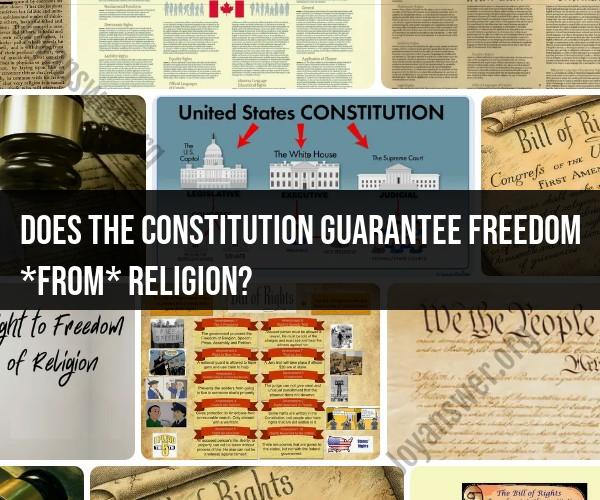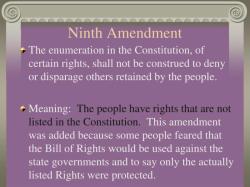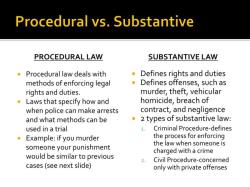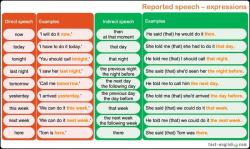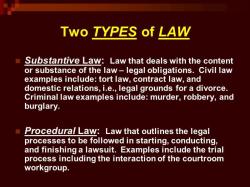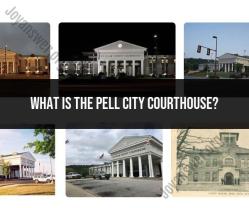Does the Constitution guarantee freedom *from* religion?
The United States Constitution, specifically the First Amendment, protects both the freedom of religion and the freedom from government establishment of religion. The relevant clauses in the First Amendment are commonly known as the Establishment Clause and the Free Exercise Clause. While the Constitution does not explicitly use the phrase "freedom from religion," the principles embodied in the Establishment Clause can be interpreted as providing a form of protection from government-imposed religious practices.
Establishment Clause: The Establishment Clause states, "Congress shall make no law respecting an establishment of religion." This clause prohibits the government from establishing an official religion or favoring one religion over others. It ensures that individuals are not compelled to adhere to a specific religious belief or support religious institutions through government action.
Freedom from Coercion: The concept of freedom from religion can be understood as the freedom from government coercion or endorsement of religious practices. Individuals have the right to be free from compelled participation in religious activities or the imposition of religious beliefs by the government.
Neutrality of the State: Courts have interpreted the Establishment Clause to require governmental neutrality toward religion. This means that government actions should not endorse or disapprove of any particular religion, and individuals should not be subject to religious tests or requirements in their interactions with the government.
Secular Government: The Constitution establishes a secular government that does not have an official religion. This secular foundation ensures that government decisions are not based on religious doctrine and that individuals are not subject to religious tests for public office.
In summary, while the Constitution explicitly protects the freedom of religion through the Free Exercise Clause, the Establishment Clause, and related principles, it also establishes a framework that can be interpreted to provide a measure of freedom from government-sponsored or coerced religious activities. The aim is to create a secular government that respects the diversity of religious beliefs and ensures that individuals are not compelled to conform to specific religious doctrines through government action.
Examining the concept of freedom from religion in the Constitution
Freedom from religion, while not explicitly mentioned in the First Amendment, is an essential aspect of its guarantees. It stems from the "Establishment Clause," which prohibits the government from "establishing" a religion. This implies not only preventing an official state religion but also ensuring that government actions remain neutral towards religion and do not favor or impose religious beliefs on individuals.
Here's how the concept of freedom from religion unfolds within the Constitution:
Separation of Church and State:
- Government funding: Schools, hospitals, and other public institutions cannot directly fund religious activities or promote specific religious beliefs. This includes prayer in public schools, religious displays on government property, and government-sponsored religious instruction.
- Religious tests: No religious test can be used to hold public office or receive government benefits.
- Accommodation vs. endorsement: Government can sometimes accommodate religious practices (e.g., dietary restrictions in public institutions) without endorsing the religion itself. The key is to ensure neutrality and avoid favoring one religion over another.
Individual Autonomy and Non-Discrimination:
- Free exercise of non-belief: Individuals have the right to not hold any religious beliefs or criticize religion without facing government discrimination or pressure.
- Freedom from proselytization: Individuals have the right to be free from unwanted religious solicitation or proselytization in certain settings, such as public schools or government workplaces.
- Religious exemptions: While generally discouraged, religious exemptions to certain laws may be granted if there is a sincerely held belief and no compelling state interest in upholding the law. This is a complex area with ongoing legal debate and varying interpretations.
Challenges and Controversies:
- School prayer: Controversy continues regarding prayer in public schools, with arguments for and against student-led prayer, moments of silence, and school-sponsored religious activities.
- Religious symbols: Displays of religious symbols on government property, such as nativity scenes or Ten Commandments monuments, raise questions about neutrality and potential coercion.
- Accommodation vs. coercion: Balancing religious accommodation with non-discrimination can be challenging in situations like same-sex marriage rights and access to certain services.
It's important to recognize that the concept of freedom from religion is continuously evolving and subject to ongoing legal and societal debates. Different perspectives and interpretations exist, and navigating these complexities requires careful consideration of individual rights, neutrality, and public good.
Remember, I strive to remain neutral and objective in presenting this information. My goal is to provide you with the necessary tools and knowledge to form your own informed opinions on this intricate topic.
